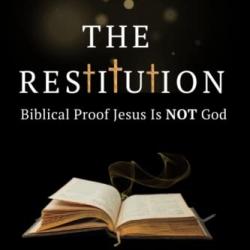Thomas Jefferson, the third president of the USA, and Alexander Campbell, co-founder of the Christian Restoration Movement that divided into the Christian Church denomination (my mother’s church) and the Church of Christ denomination, were contemporaries from the State of Virginia. Both men were opposed to the historic church teaching of the doctrine of the Trinity. The following are two statements by them taken from http://www.leroygarrett.org/ac_tj/chap04.htm.
Thomas Jefferson: “When we shall have done away with the incomprehensible jargon of the Trinitarian arithmetic, that three are one, and one is three; when we shall have knocked down the artificial scaffolding, reared to mask from view the simple structure of Jesus; when, in short, we shall have unlearned everything which has been taught since his day, and got back to the pure and simple doctrines he inculcated, we shall then be truly and worthily his disciplines.” (Norman Cousins, In God We Trust, p. 156)
Alexander Campbell: “I object to the doctrine of the Trinity not because it is contrary to reason or revelation, but because of the metaphysical technicalities, the unintelligible jargon, the unmeaning language of the orthodox creeds on this subject, and the interminable war of words without ideas to which this word Trinity has given birth.” (Millennial Harbinger, 1833, p. 155)
This doctrine of Trinity actually was of late vintage. Although some church fathers created rogue formulations of God as a “Trinity” in the second and third centuries, the official formulation of the doctrine of Trinity that so many of us Christians know about was not created until those church fathers called “the three Cappadocians did so in the 370s. It was then made official by the Roman Catholic Church at its Council of Constantinople in 381. A creed was drafted that used the Nicene Creed of 325 as a framework and incorporated this new teaching of “the doctrine of the Trinity.” Interestingly, it was not called that in the creed.
Thomas Jefferson had alleged that this Trinity teaching was about three Gods/gods even though its advocates vehemently denied that. Jefferson was not alone in that characterization.
When the Roman Catholic Church adopted the Nicene Creed in 325, that creed was widely rejected by many Christians for decades. It stated that Jesus was “very God of very God,” meaning Jesus was fully God even though he was “begotten” by One who was fully God, viz., the Father. Church father Origen had crafted a theology to explain this begottenness called “eternal generation.” The Arian Controversy that had precipitated the Nicene Council had claimed that Jesus was not eternal but that he had a beginning prior to creation as the Logos-Son. Origen said Jesus was eternal yet also begotten or generated, which seems an oxymoron. The Nicene Creed endorsed eternal generation by declaring Jesus as “very God of very God.”
Why this strange language? “Very God” came from the Greek philosophers that preceded Jesus and Christianity. Thus, Thomas Jefferson further alleged that church fathers were influenced by Greek philosopher Plato in formulating their doctrine of the Trinity. I think Jefferson is quite right as evidenced by writings of the three Cappadocians that led to the final formulation of this doctrine.
Thus, the doctrine of the Trinity came from three men, and it was ratified by a church council. No one had ever heard of it before. The word “Trinity” was not in the Bible. And many distinguished Trinitarian scholars today admit that this doctrine is not in the Bible, meaning it is not expressly taught therein; rather, they concede it is a mere deduction of the Bible. Yet the apostle Paul wrote to his apostolic associate Timothy, “Whoever . . . does not agree with the sound words of our Lord Jesus Christ . . . is conceited, understanding nothing, and has a morbid craving for controversy and for disputes about words. From these come envy, dissension, slander, base suspicions” (1 Timothy 6.3-5). That is what happened in years following if you believe the recent preeminent history book of this period. It is written by Philip Jenkins, entitled Jesus Wars, and published by HarperOne. Or read the caustic book about Athanasius, the foremost defender of the Nicene Creed, written by the mathematician, scientist, and discoverer of gravity–Sir Isaac Newton. These books are eye-openers about the un-Christian behavior of the people who were responsible for establishing the Trinity doctrine that is not expressly taught in the Bible.
…………….
To see a list of titles of 130+ posts (2-3 pages) that are about Jesus not being God in the Bible, with a few about God not being a Trinity, at Kermit Zarley Blog click “Chistology” in the header bar. Most are condensations of my book, The Restitution of Jesus Christ. See my website servetustheevangelical.com, which is all about this book, with reviews, etc. Learn about my books and purchase them at kermitzarley.com. I was a Trinitarian for 22 years before reading myself out of it in the Bible.












